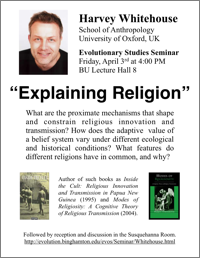It’s not often that I read an article or interview about the evolution of “religion” that does not provoke some dissent — an objecting inner voice saying “that’s not quite right” or “that’s really wrong.” So it was a pleasure to read this recent Nautilus interview with Oxford anthropologist Harvey Whitehouse, a major figure in cognitive and evolutionary religious studies (“ERS”). Whitehouse hit all the right notes while answering several questions stemming from popular misconceptions of religion. Because his answers are so good, I encourage you to read it in full. As points of emphasis, I particularly enjoyed these excerpts:
At some point in human history many societies switched from animistic forms of religion to institutionalized systems that are closer to today’s religions. How do you explain this transition?
The really critical transition is one that occurs in the gradual switch from a foraging, hunting-and-gathering lifestyle to settled agriculture, where you’re domesticating animals and cultivating crops. What happens is a major change in group size and structure. I think religion is really a core feature in that change. What we see in the archeological record is increasing frequency of collective rituals. This changes things psychologically and leads to more doctrinal kinds of religious systems, which are more recognizable when we look at world religions today.
Why did that transformation occur in agricultural societies?
The cooperation required in large settled communities is different from what you need in a small group based on face-to-face ties between people. When you’re facing high-risk encounters with other groups or dangerous animals, what you want in a small group is people so strongly bonded that they really stick together. The rituals that seem best-designed to do that are emotionally intense but not performed all that frequently. But when the group is too large for you to know everyone personally, you need to bind people together through group categories, like an ethnic group or a religious organization. The high frequency rituals in larger religions make you lose sight of your personal self.
You’re suggesting you don’t have to reduce religious experience to belief systems. It’s the experience itself that sweeps you along and binds you to other people.
It’s about both belief and experience. I do think we can kind of separate the two. Imagine having a brain that’s naturally predisposed to believe some things more readily than others, and then over generations, cultural systems develop in ways that essentially play into those predispositions. The point is that our experiences are made meaningful by our implicit beliefs and the two basically work together.
Psychologically, why is God such a powerful idea?
It may be a product of cultural evolution and the shift to much larger and more complex societies. When you use the singular “God,” you’re talking about some kind of high god, which probably means a god that’s omniscient and cares about the morality of our behavior and punishes us when we behave badly. That’s a relatively recent cultural innovation that may have been an adaptation to living in very large societies.
That’s good stuff, but perhaps even better is the humility and methodological prudence on display:
Do you think science can fully explain religion?
I don’t know about fully explain. I’d like to think that science will one day be able to explain why we’re inclined to adopt these different things that we lump together as religion, but I don’t think explaining religion is the same as explaining it away. I don’t think science will ever be able to tell us whether or not there’s a god. That will always be a matter of faith. I’m in favor of a humble approach, but I do think that humility should cut both ways. Religious people should be open to the possibility that some of the things they find most mysterious about the meaning of life or the cosmos might actually turn out to be explainable. Of course, science has been pretty successful at turning certain mysteries into soluble problems. But at the same time I think much of human life takes us beyond the scope of scientific explanation and that’s true of religion, too.
And so what does, in summary, explain religion?
Well, it’s not a monolithic entity for which we could offer an overall explanation. If we define what we’re really interested in—supernatural agents, rituals, afterlife beliefs, creation stories—then we’d find they result from quite different mechanisms and have different evolutionary histories. There just can’t be a magic bullet explanation of “religion” as if it’s one single thing.
The interview contains several more insights (e.g., religion did not evolve to provide meaning or purpose; New Atheists shallowly see religion as a set of propositions about the world; we need more data on the Axial Age) that make it a nice teaching resource. Thanks to the interviewer, Steve Paulson, for providing it.


